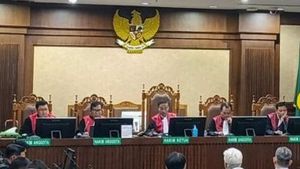JAKARTA - Animal researchers at the Center for the Application of Standard Instruments of the Ministry of Environment and Forestry (KLHK) Tri Atmoko asked the authorities to take firm action against the perpetrators of hunting for wild animals protected by law to keep animals from becoming extinct. Animals in the wild endemic to Kalimantan are now very rare or nearing extinction, one of which is the ivory hornbill," said Tri Armoko in Samboja, Friday, February 25, quoted from Antara. other people who hunt animals in the wild, be it orangutans, proboscis monkeys, and various types of birds. The government, he said, in an effort to reduce the number of hunting for protected animals in Indonesia, has issued a regulation in the form of Law Number 5 of 1990 concerning Conservation Natural Resources and Ecosystems.
Another regulation is from the relevant ministry, namely the Minister of Environment Regulation Number P106 of 2018 concerning Wild Plants and Animals. To ensnare the perpetrators of the trade in protected wildlife, it is regulated in Article 21 paragraph (2) and Article 40 paragraph (2) of Law Number 5 / 1990, each of which paragraphs are interrelated. In Article 21 paragraph (2) letters a and b it is stated that everyone is prohibited from capturing, injuring, killing, storing, possessing, maintaining, transporting, and trading protected animals alive or dead.
Then in Article 40 paragraph (2) it is stated that whoever deliberately violates the provisions as referred to in Article 21 paragraph (1) and paragraph (2) as well as Article 33 paragraph (3), shall be punished with imprisonment for a maximum of five years and a fine at most Rp. 100 million.
"If many perpetrators of breaking the law receive maximum sanctions, of course the impact will be that many perpetrators will be deterred so that protected animals are not threatened with extinction like now, for example the hornbill or hornbill, a species of ivory hornbill," he said. , in Indonesia there are 13 species, 8 species of which are on the island of Borneo. Of these eight species, he continued, one of them is the ivory hornbill which is currently very difficult to see even in virgin forests, as a result of the large number of hunting for these birds whose beaks are traded illegally. "Many of the perpetrators of hunting this big beak have been caught by officers, even thousands of ivory hornbills have been confiscated. I also ask residents to stop hunting because hornbills are sacred birds for the people of Kalimantan," said Tri.
The English, Chinese, Japanese, Arabic, and French versions are automatically generated by the AI. So there may still be inaccuracies in translating, please always see Indonesian as our main language. (system supported by DigitalSiber.id)













